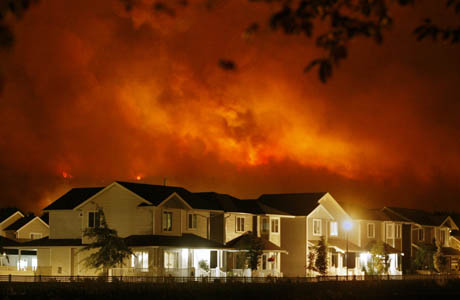Climate Change and Health in British Columbia: government-commissioned research paper predicts dangers posed to BC by radical shift in weather
Photo Credit: Devastating wildfires, such as the Kelowna inferno of 2003, could soon occur on average once a decade. Photograph by: Andy Clark file, Reuters
Forecast: Warmer, Wetter, Wilder
Reporter Sam Cooper’s stories about the impact of climate change on life in B.C. are featured in the June 22, 2009 issue of the Province newspaper.
“Dark smoke blankets the province as mega-fires devour withered pine forests,” Cooper writes. “Dust bowls scour the Okanagan, increasingly resembling the Sahara. When rain relieves parched land it comes in hurricane-driven torrents. Hills slide down on homes and water wells are poisoned. Plagues and pestilence march north, carried by rodents, insects, birds and humans. Disease thrives while flood levels rise.
“Welcome to B.C. in 2050 — when the strong will survive but the most vulnerable could die.”
Cooper’s stories examine work being done to protect B.C.’s vulnerable populations from possible environmental disaster and the possible winners and losers in a climate-change scenario.
About the Research
To download a copy of the November 2008 research report by the Pacific Institute for Climate Solutions, click on Climate Change and Health in British Columbia. The purpose of this paper is to outline how climate change is likely to affect the health of British Columbians and to suggest a way forward to promote health and policy research, and adaptation to these changes.


